The world of marketing is evolving at an unprecedented pace, and artificial intelligence (AI) marketing is at the forefront of this transformation. As businesses strive to stay competitive and engage with their target audiences effectively, AI has emerged as a game-changer, offering innovative solutions and insights that were previously unattainable. This comprehensive guide explores the power of AI in marketing, unveils hidden gem strategies to enhance its effectiveness, and highlights how Prism Reach, an innovative AI-powered SaaS solution, can elevate your marketing customization efforts.
Key Facts and Statistics
Understanding the impact of AI in marketing is supported by compelling statistics:
- Market Growth: The global AI in marketing market is expected to reach $40 billion by 2025.
- Customer Preference: According to Epsilon, 80% of consumers are more likely to make a purchase when brands offer personalized experiences.
- ROI Improvement: McKinsey & Company found that personalization can lift sales by 10% or more and deliver five to eight times the ROI on marketing spend.
- Engagement Rates: Personalized marketing can increase customer engagement by up to 50%.
- Conversion Rates: AI-driven marketing strategies can boost conversion rates by as much as 202%.
Upgrade Your Email Marketing with AI Personalization!
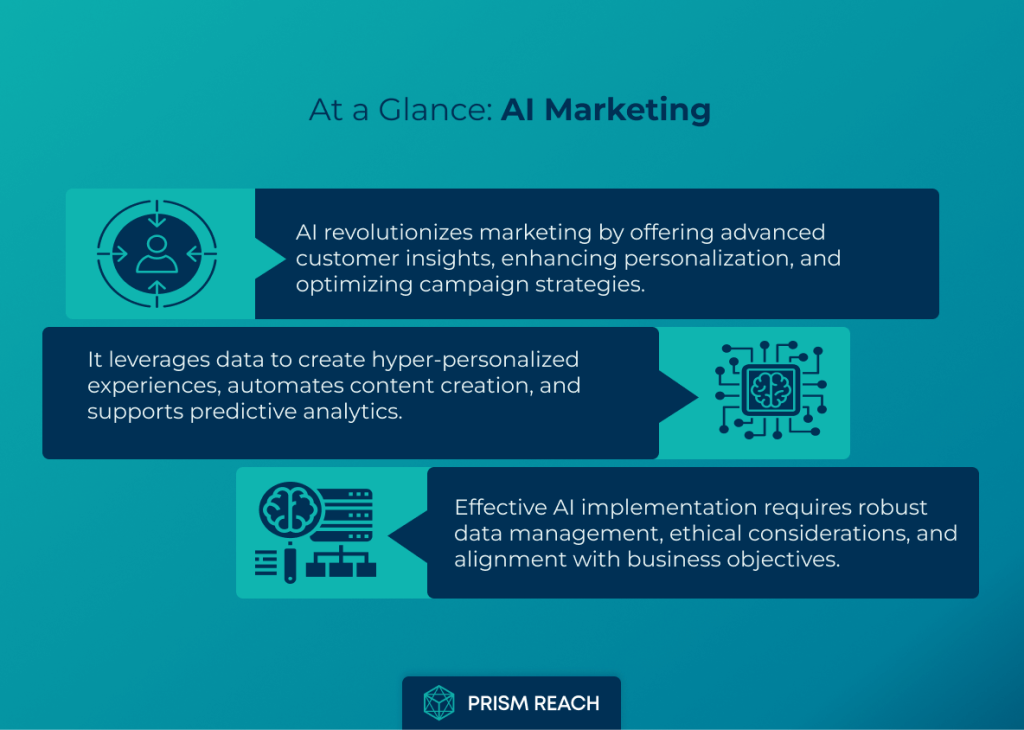
Understanding AI Marketing
AI marketing involves the use of artificial intelligence technologies to automate, optimize, and personalize marketing efforts. By leveraging vast amounts of data and advanced algorithms, AI enables marketers to gain deeper insights into customer behavior, preferences, and trends, allowing for more targeted and effective marketing campaigns.
What is AI Marketing?
At its core, AI marketing is about using machine learning, natural language processing, and other AI technologies to enhance marketing strategies and tactics. This includes everything from automating repetitive tasks and optimizing ad spend to personalizing customer interactions and predicting future behavior.
Why is AI Marketing Important?
The rise of AI in marketing can be attributed to several key factors:
- Data-Driven Insights: AI can analyze vast amounts of data quickly, providing actionable insights that inform strategic decisions.
- Enhanced Personalization: AI enables hyper-personalized marketing, delivering tailored experiences that resonate with individual customers.
- Efficiency and Scalability: AI automates time-consuming tasks, allowing marketers to focus on strategy and creativity while scaling their efforts effectively.
- Improved ROI: By optimizing marketing campaigns and targeting the right audiences, AI can significantly enhance return on investment.
Comparison: AI in Marketing
1. AI in Personalization
- Advantages:
- Hyper-Personalized Experiences: AI can tailor content at an individual level, leading to more relevant interactions.
- Increased Engagement & Conversion: Tailored content drives higher engagement and better conversion rates.
- Enhanced Loyalty: When customers receive content that feels made-for-them, loyalty can increase.
- Automation Efficiency: Automates many individualized marketing tasks, reducing manual workload.
- Disadvantages:
- Perceived Invasiveness: Some customers may find hyper-personalization intrusive.
- Data Dependence: Its effectiveness relies on having high-quality, accurate customer data.
2. AI in Customer Segmentation
- Advantages:
- Granular Segmentation: AI can identify subtle customer traits and create highly detailed segments.
- Targeted Campaigns: Enables precise targeting, which can improve overall campaign ROI.
- Campaign Efficiency: Streamlines the segmentation process, making campaign planning more efficient.
- Disadvantages:
- Risk of Over-Segmentation: Excessive segmentation might dilute campaign focus.
- Data Integration Challenges: Requires continuous and robust data integration to remain accurate.
3. AI in Content Creation
- Advantages:
- Rapid Content Generation: AI can produce content at scale, speeding up production.
- Personalization at Scale: Adapts content to suit various audiences and formats.
- Idea Enhancement: Can generate new creative ideas and variations to keep content fresh.
- Time Efficiency: Reduces the time needed for manual content creation.
- Disadvantages:
- Creativity Nuances: AI-generated content may lack the depth and nuance of human creativity.
- Generic Output: There is a risk of producing repetitive or less differentiated content.
4. AI in Predictive Analytics
- Advantages:
- Anticipates Customer Needs: Helps forecast future behaviors and market trends, allowing proactive actions.
- Optimized Marketing Timing: Enhances decision-making by identifying the best times for marketing actions.
- Campaign Effectiveness: Provides actionable insights that can improve campaign strategies.
- Opportunity Identification: Assists in spotting potential growth areas ahead of time.
- Disadvantages:
- High-Quality Data Dependency: The accuracy of predictions is heavily reliant on the quality of data inputs.
- Interpretation Complexity: Predictive results can be complex to interpret and act upon effectively.
5. AI in Customer Support
- Advantages:
- 24/7 Availability: Provides round-the-clock support to handle customer inquiries.
- Efficient Inquiry Handling: Can manage large volumes of customer queries, reducing wait times.
- Data Collection: Gathers valuable interaction data that can inform future improvements.
- Cost Reduction: Automates support tasks, leading to significant operational cost savings.
- Improved Consistency: Ensures consistent responses and standardization in service quality.
- Disadvantages:
- Handling Complex Issues: May struggle with more complicated or nuanced customer problems.
- Lack of Empathy: Automated responses can sometimes miss the human touch necessary for empathetic support.
This comparison illustrates that while AI-driven solutions offer significant efficiencies and performance enhancements across personalization, segmentation, content creation, predictive analytics, and customer support, each area also faces unique challenges. Balancing these advantages and addressing the associated drawbacks is key to a successful AI strategy in marketing and customer service.
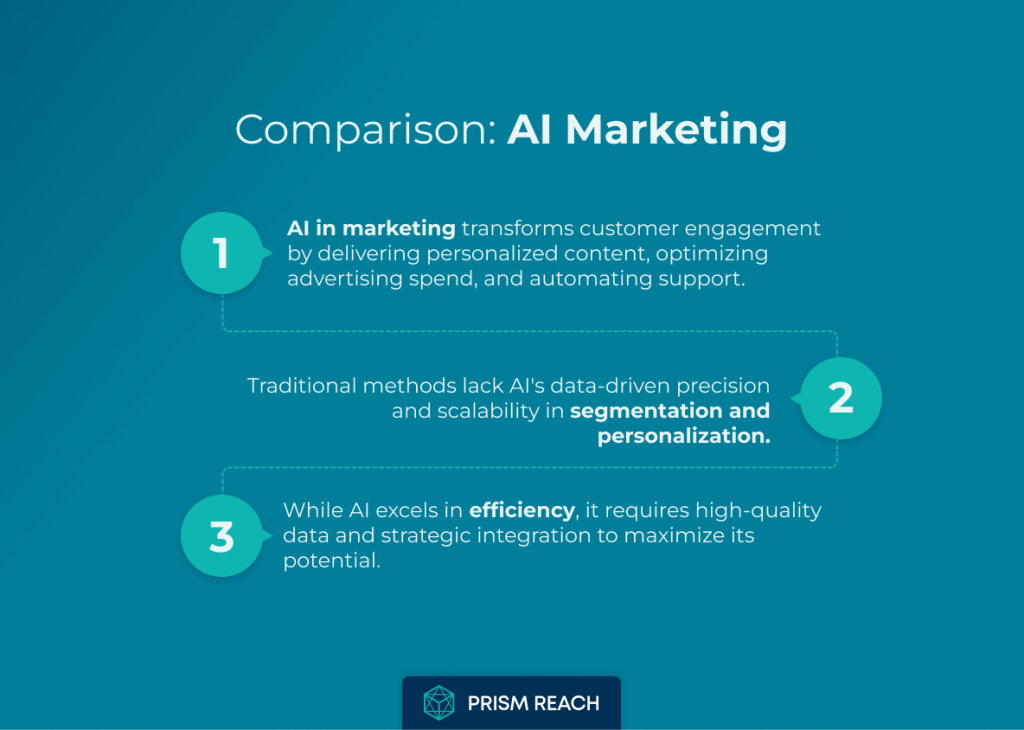
5 Hidden Gem Strategies to Enhance AI Marketing
Maximizing the impact of AI marketing requires innovative strategies that go beyond conventional approaches. Here are five hidden gem strategies that can significantly enhance your marketing effectiveness:
Predictive Personalization
Strategy: Utilize predictive analytics to anticipate customer needs and preferences based on historical data, allowing for tailored marketing messages.
- Effectiveness: High; predictive personalization can lead to improved customer engagement and conversion rates.
- Obscurity: While many marketers use analytics, the specific application of predictive analytics for personalization is often overlooked.
- Ease of Implementation: Requires investment in AI tools but can be integrated into existing marketing strategies.
- Uniqueness: This strategy allows brands to proactively address customer needs rather than reacting to them.
Example: A subscription-based service uses Prism Reach’s predictive analytics to identify customers who are likely to cancel their subscriptions. By proactively reaching out with personalized offers and support, the company successfully reduces churn rates and increases customer retention.
Dynamic Content Generation
Strategy: Use AI to create dynamic content that adapts in real-time based on user interactions and preferences.
- Effectiveness: Dynamic content can significantly increase engagement rates as it ensures relevance for each recipient.
- Obscurity: Many marketers still rely on static content without exploring the benefits of dynamic options.
- Ease of Implementation: Most modern content management systems support dynamic content; requires some setup but manageable with existing tools.
- Uniqueness: This approach allows for highly personalized communication without creating multiple versions of an email or webpage.
Example: A health and wellness brand uses Prism Reach to create interactive quizzes that help users identify their fitness goals. Based on quiz results, the brand sends personalized workout plans and product recommendations, enhancing user engagement and driving sales.
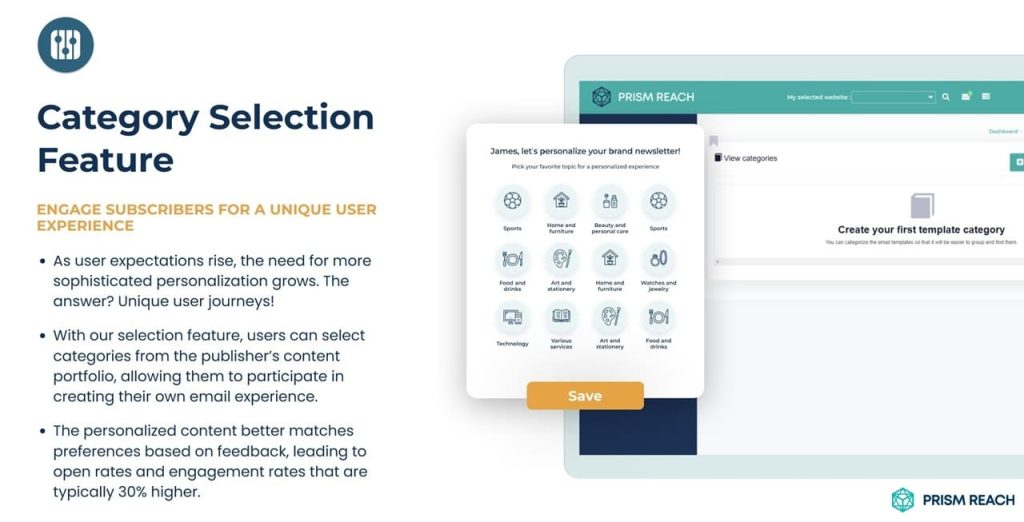
AI-Powered Chatbots
Strategy: Implement AI chatbots to handle customer inquiries and provide personalized recommendations based on user behavior.
- Effectiveness: Chatbots can improve response times and customer satisfaction, leading to higher retention rates.
- Obscurity: While chatbots are common, the potential for deep personalization through AI is often underutilized.
- Ease of Implementation: Many platforms offer chatbot solutions that are easy to integrate into websites and social media.
- Uniqueness: This strategy enhances customer service by providing immediate, personalized responses at any time.
Example: An eCommerce platform integrates Prism Reach’s AI-powered chatbots to assist customers with product recommendations based on their browsing and purchase history. The chatbot provides real-time assistance, enhancing the shopping experience and increasing conversion rates.
Hyper-Segmentation
Strategy: Use AI to create hyper-segmented audience groups based on detailed behavioral data, allowing for highly targeted marketing campaigns.
- Effectiveness: Hyper-segmentation leads to more relevant messaging, which can improve conversion rates significantly.
- Obscurity: Many brands still use broad segments without leveraging the power of detailed behavioral insights.
- Ease of Implementation: Requires robust data collection and analysis capabilities but is increasingly supported by marketing platforms.
- Uniqueness: This approach allows for a more nuanced understanding of customer preferences and behaviors.
Example: A fashion retailer uses Prism Reach to analyze customer behavior and create hyper-segmented groups based on shopping patterns, preferences, and engagement levels. This allows the retailer to send highly targeted marketing messages that resonate with each segment, resulting in increased sales and customer loyalty.
Automated Ad Optimization
Strategy: Utilize AI algorithms to continuously optimize ad performance in real-time based on engagement metrics and conversion data.
- Effectiveness: Automated optimization ensures that advertising budgets are spent efficiently, maximizing ROI.
- Obscurity: While programmatic advertising is known, the depth of real-time optimization capabilities is often underutilized.
- Ease of Implementation: Many advertising platforms now offer built-in AI optimization features, making it easier to implement.
- Uniqueness: This strategy allows for agile marketing practices that adapt quickly to changing consumer behaviors.
Example: A multinational electronics company uses Prism Reach to automate and optimize its digital advertising campaigns. The AI analyzes real-time engagement data and adjusts ad placements, bids, and creative elements to maximize effectiveness. This results in a 2,930% increase in leads and a 40% decrease in cost per lead.
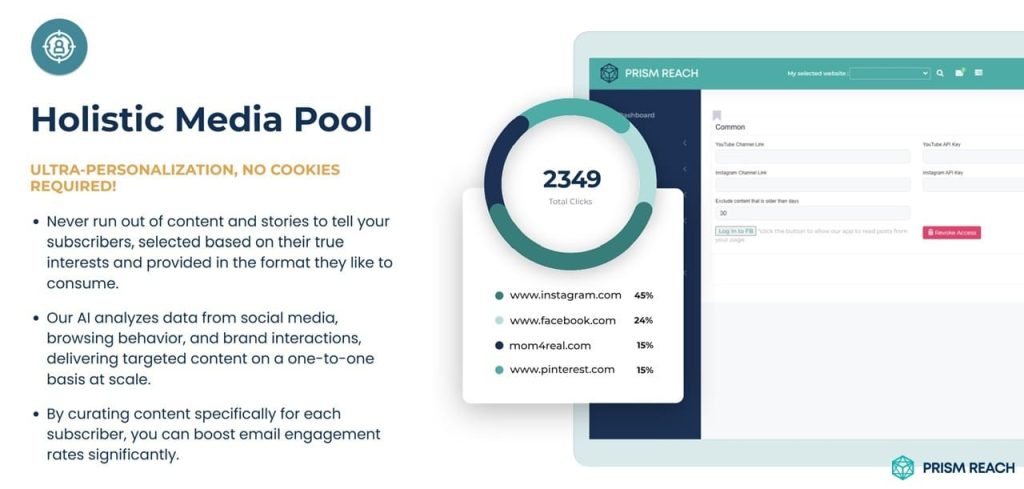
Benefits of Using Prism Reach in AI Marketing
Integrating advanced tools like Prism Reach into your AI marketing strategies can significantly amplify their effectiveness. Prism Reach offers a suite of features specifically designed to enhance personalization, streamline campaign management, and provide actionable insights that drive better marketing outcomes. Here are three key benefits of using Prism Reach in AI marketing:
1. Enhanced Personalization Through AI
Prism Reach utilizes sophisticated AI algorithms to create detailed user avatars based on subscriber behavior and preferences. This level of personalization is crucial for effectively reaching and engaging diverse audiences.
- Tailored Content: AI-driven personalization ensures that each subscriber receives content that is relevant to their unique preferences and interests.
- Behavioral Insights: By analyzing patterns in subscriber behavior, Prism Reach can predict future actions and tailor marketing messages accordingly, increasing the likelihood of positive engagement.
- Cultural Sensitivity: Personalized content respects and reflects the cultural nuances of different demographic groups, fostering a deeper connection with diverse audiences.
Example: A global apparel brand uses Prism Reach to segment its email list based on cultural preferences and purchase history. The AI personalizes each email with culturally relevant product recommendations and messaging, resulting in higher open and conversion rates across diverse markets.
2. Dynamic Content Selection Tailored to Diverse Audiences
Prism Reach’s ability to dynamically select and tailor content based on real-time data ensures that your emails remain relevant and engaging to a diverse audience.
- Real-Time Adaptation: The platform continuously updates content based on the latest subscriber interactions and feedback, keeping your campaigns fresh and responsive to changing preferences.
- Localized Content: Prism Reach can automatically adjust content to align with local cultural events, holidays, and trends, enhancing the relevance of your marketing messages.
- Inclusive Messaging: Dynamic content ensures that marketing messages are inclusive and considerate of diverse perspectives, avoiding one-size-fits-all approaches.
Example: An international food brand leverages Prism Reach to customize its email content based on regional dietary preferences and cultural festivities. During Ramadan, the platform automatically highlights products and recipes that cater to fasting practices, increasing engagement and sales in Muslim-majority regions.
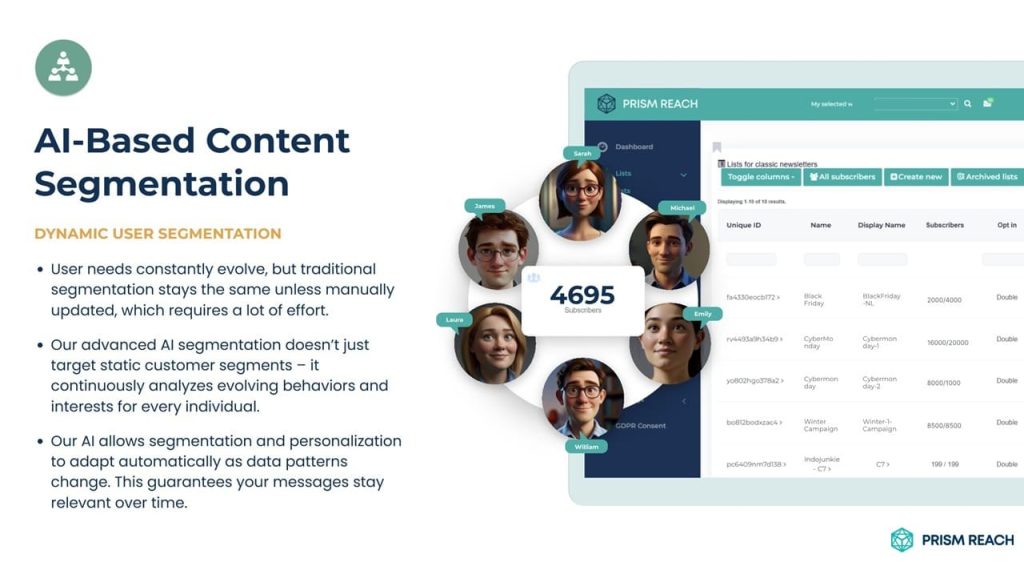
3. Comprehensive Performance Monitoring for Inclusive Campaigns
Prism Reach provides robust tracking tools to monitor the effectiveness of your email campaigns, ensuring that your AI marketing strategies are yielding the desired results.
- Demographic Analytics: The platform offers detailed insights into how different demographic segments are interacting with your campaigns, allowing for data-driven adjustments to improve effectiveness.
- Engagement Metrics: Track key performance indicators such as open rates, click-through rates, and conversion rates across diverse groups to identify what resonates most with each segment.
- Feedback Integration: Prism Reach can incorporate direct feedback from subscribers to refine and enhance your marketing strategies continuously, ensuring ongoing alignment with diverse audience needs.
Example: A multinational electronics company uses Prism Reach to analyze engagement metrics from its diverse customer base. Insights reveal that certain product categories perform better with specific demographic groups, allowing the company to tailor future campaigns to highlight these products more prominently within those segments, thereby maximizing relevance and impact.
Practical Tips for Enhancing AI Marketing in Email Marketing
To effectively enhance AI marketing in your email marketing efforts, consider the following practical tips. These strategies will help ensure that your campaigns are inclusive, culturally sensitive, and highly engaging for a diverse audience:
1. Personalization Techniques
- Use Subscriber Data to Personalize Content: Leverage demographic and behavioral data to create personalized subject lines and email content that reflect the unique backgrounds and interests of your subscribers.
- Segment Your Audience: Divide your email list into segments based on factors such as ethnicity, gender, age, and cultural preferences. This allows for more targeted and relevant messaging.
- Implement Dynamic Content Blocks: Use dynamic content blocks that adapt to individual subscriber interests, ensuring that each email delivers content that is meaningful and engaging to the recipient.
Example: A global travel agency uses Prism Reach to segment its email list by region and cultural preferences. Personalized emails include travel packages that cater to specific cultural festivals and holidays, increasing relevance and engagement among diverse subscribers.
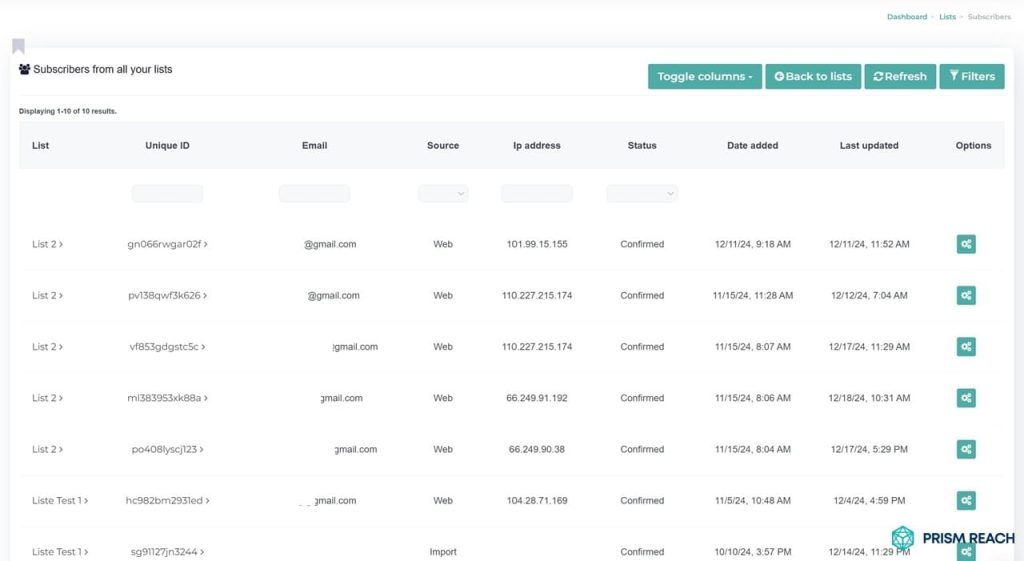
2. Automation Best Practices
- Set Up Automated Workflows: Create automated email workflows that include welcome series, cultural event greetings, and post-purchase follow-ups tailored to different demographic groups.
- Optimize Send Times: Use predictive analytics to determine the best times to send emails to different segments, considering factors such as time zones and cultural schedules.
- Automate Cross-Selling and Upselling: Develop automated campaigns that recommend products based on customer behavior and preferences, ensuring that recommendations are culturally relevant and personalized.
Example: An online bookstore employs Prism Reach to automate personalized recommendations based on customers’ previous purchases and cultural interests. During Diwali, the system sends automated emails featuring books by South Asian authors, enhancing relevance and boosting sales in that segment.
3. Continuous Improvement and Adaptation
- Analyze Campaign Performance: Regularly review performance metrics across different demographic segments to identify what works and what needs improvement.
- Gather and Integrate Customer Feedback: Use surveys, polls, and direct feedback to understand the preferences and experiences of your diverse audience, and adjust your strategies accordingly.
- Stay Updated with Trends and Technologies: Keep abreast of the latest email marketing trends and technologies that support inclusivity and personalization, ensuring your campaigns remain effective and relevant.
Example: A fitness brand uses Prism Reach to continuously monitor the performance of its diverse email campaigns. Feedback collected through integrated surveys reveals a high demand for workout plans tailored to different cultural practices, prompting the brand to develop and promote culturally specific fitness programs.
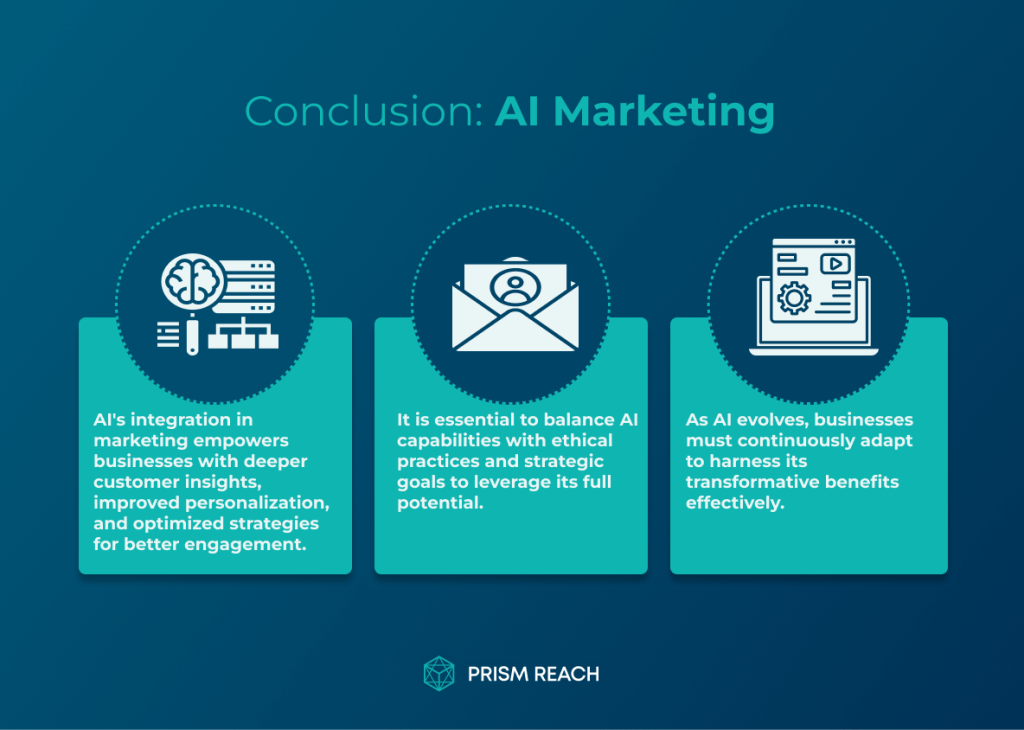
Conclusion
AI marketing is no longer a futuristic concept but a reality that businesses must embrace to stay competitive. By harnessing the power of AI, marketers can gain unparalleled insights into customer behavior, create highly personalized experiences, and optimize their efforts for maximum impact. However, it is crucial to approach AI implementation strategically, considering factors such as data quality, ethical considerations, scalability, and alignment with business goals.
Integrating advanced tools like Prism Reach further amplifies these strategies by providing enhanced personalization through AI, dynamic content selection tailored to diverse audiences, and comprehensive performance monitoring for inclusive campaigns. Prism Reach empowers businesses to create highly personalized and culturally relevant email marketing experiences that resonate with individual subscribers, leading to higher engagement, loyalty, and revenue growth.
As AI continues to shape the marketing industry, businesses must prioritize data quality and integration, ensure ethical and transparent use of customer data, align AI initiatives with business goals, and foster a culture of continuous learning and adaptation. The rise of AI in marketing also presents exciting opportunities for collaboration and innovation across industries.
While AI can automate and optimize many aspects of marketing, it cannot replace the creativity, empathy, and strategic thinking that human marketers bring to the table. The most successful businesses will be those that can strike a balance between leveraging AI’s capabilities and maintaining a human touch in their marketing efforts.
If you’re ready to embark on your own AI marketing journey, we invite you to explore the capabilities of Prism Reach and discover how our platform can help you unlock the full potential of your email marketing efforts.
Sources
- Harvard Business Review: How to Design an AI Marketing Strategy
- Forbes: How AI is Revolutionizing Marketing in 2024
- Meltwater: AI in Marketing
- Flow20: Future Trends in AI and Digital Marketing
- OptiMonk: AI in Digital Marketing